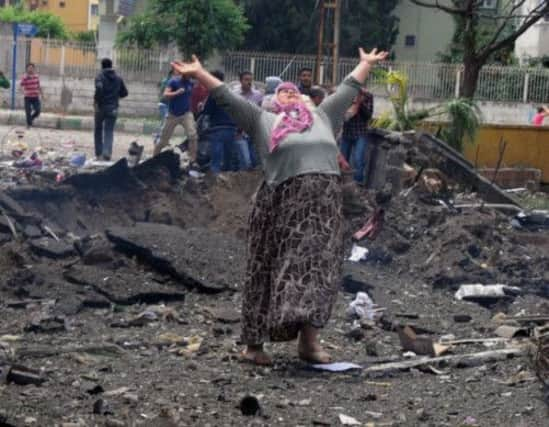Car bombs kill 43 in Turkish border town


Turkey’s deputy prime minister said Syria’s intelligence and military were “the usual suspects” behind the bombings but authorities were still investigating the attacks.
The blasts, which came 15 minutes apart, have heightened fears that violence from Syria’s brutal civil war is spreading to its northern neighbour.
Advertisement
Hide AdAdvertisement
Hide AdOne of the car bombs exploded outside the city hall while the other went off outside the post office in the town of Reyhanli, a main hub for Syrian refugees and rebel activity in Turkey’s Hatay province. Images showed people carrying victims through the rubble-strewn streets to safety.
Deputy prime minister Bülent Arinç announced the toll of dead and wounded in the blasts, which he linked to Syria.
“We know that the Syrian refugees have become a target of the Syrian regime,” he said. “Reyhanli was not chosen by coincidence.
“Our thoughts are that their Mukhabarat [Syrian intelligence agency] and armed organisations are the usual suspects in planning and the carrying out of such devilish plans.”
Arinç said Turkey would “do whatever is necessary” if it was proven that Syria was behind the attack.
Prime Minister Recep Tayyip Erdogan also raised the possibility that the bombings may have been related to Turkey’s peace talks with Kurdish rebels, intended to end a nearly 30-year-old insurgency.
Syrian mortar rounds have fallen over the border before, but if the latest explosions turn out to be linked to Syria it would be by far the biggest death toll in Turkey related to its southern neighbour’s civil war.
Syria shares a border of more than 500 miles with Turkey, which has been a crucial supporter of the Syrian rebel cause.
Advertisement
Hide AdAdvertisement
Hide AdAnkara has allowed its territory to be used as a logistics base and staging centre for Syrian insurgents.
Foreign minister Ahmet Davutoglu, in Berlin, vowed that Turkey would act.
“Those who, for whatever reason, attempt to bring external chaos into our country will get a response,” he said.
The main Syrian opposition group, the Syrian National Coalition, condemned the “terrorist attacks” in Reyhanli, saying it stood together with the “Turkish government and the friendly Turkish people”.
A spokesman for the coalition said it saw “these heinous terrorist acts as an attempt to take revenge on the Turkish people and punish them for their honourable support for the Syrian people”.
Reyhanli is a centre for aid and alleged weapon trafficking between Turkey and Syria, as well as for Syrian rebel activity. Apart from refugees living in camps, many Syrians escaping the civil war have also rented houses in the town.
The explosions came days before Erdogan is due to travel to the United States for talks, which are expected to be dominated by the situation in Syria.
Soner Cagaptay, an expert on Turkey at the Washington Institute, said: “This will increase the pressure on President Barack Obama next week to do something to show support to Turkey when Erdogan visits him at the White House.
Advertisement
Hide AdAdvertisement
Hide Ad“Washington will be forced to take a more pro-active position on Syria, at least in rhetoric, whether or not there is appetite for such a position here.”
The frontier area has seen heavy fighting between rebels and the Syrian regime. In February, a car bomb exploded at a border crossing with Turkey in Syria’s Idlib province, killing 14. Turkey’s interior minister has accused Syria’s intelligence agencies and its army of involvement.
Four Syrians and a Turk are in custody in connection with the 11 February attack at the Bab al-Hawa frontier post.
No-one has claimed responsibility, but a Syrian opposition faction accused the Syrian government of the bombing, saying it narrowly missed 13 leaders of the group. In that bombing, most of the victims were Syrians who had been waiting to enter Turkey.
Tensions flared between the Syrian regime and Turkey after shells fired from Syria landed on the Turkish side, prompting Germany, the Netherlands and the US to send two batteries of Patriot air defence missiles each to protect their Nato ally.
Meanwhile, in Syria yesterday, rebels said they had severed a newly built bypass road linking the capital Damascus with the northern city of Aleppo, while state media reported that government troops secured a strategic highway between the capital and the southern city of Deraa.
An activist group said the US ambassador to Syria, Robert Ford, who left the country last year, met a rebel commander at a border crossing point with Turkey.
The Aleppo Media Centre (AMC) said Ford met Colonel Abdul-Jabbar al-Akidi, head of Aleppo province’s rebel military council, at the Bab al-Salama border crossing. It posted a picture and a video of the two men standing on a road just a few yards outside a fence that appeared to be the border between Turkey and Syria. The AMC quoted al-Akidi as calling on the US to lift an arms embargo imposed on rebels.
Advertisement
Hide AdAdvertisement
Hide AdThe US has balked at sending weapons to the rebels, fearing the arms could end up in the hands of al-Qaeda-linked groups or other Islamists in the opposition ranks.
Ford was in Turkey to try to convince the opposition to commit to a proposal presented last year that involves talks with the regime of President Bashar al-Assad.